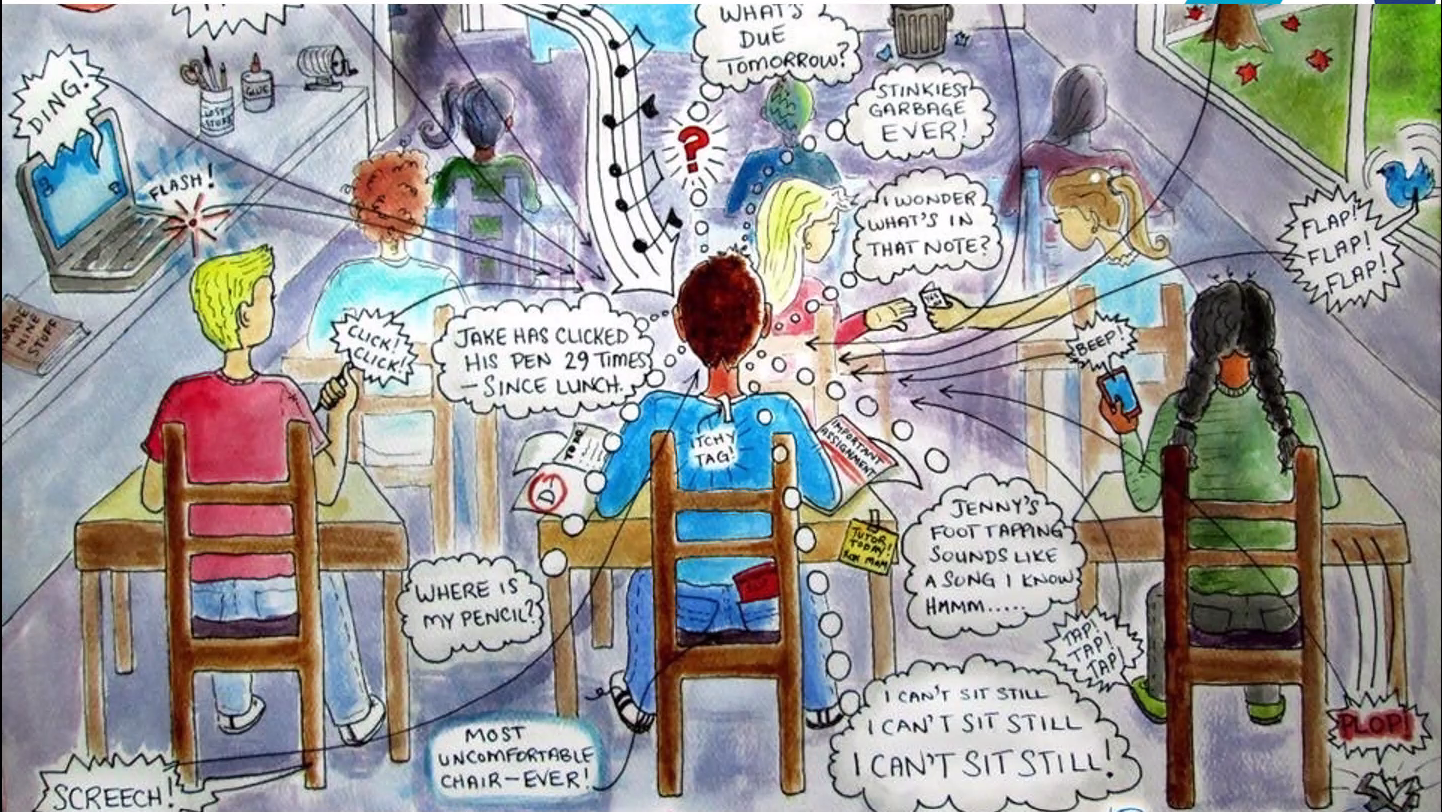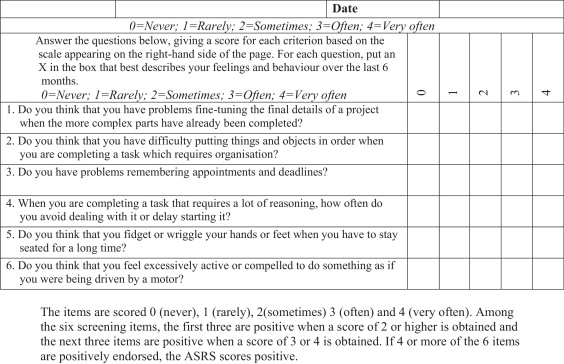Adult ADHD (Attention Deficit Hyperactivity Disorder)
Please also note our Website Disclaimer Updated 16/4/2023
Jump to section:
- Introductory videos & information
- Background
- Diagnostic process
- First steps
- Medications: Stimulants/Cognitive enhancers and others

ADHD stands for Attention-Deficit/Hyperactivity Disorder. It's a condition that makes it hard for people to focus and pay attention, and it can also cause them to be very active or have trouble sitting still. This can make it difficult for people with ADHD to do well in school, make friends, and complete everyday tasks.
The cause of ADHD is not exactly known, but scientists think it could be a combination of genetics, brain structure, and environmental factors. There are different treatments that can help people with ADHD manage their symptoms, including medication, therapy, and changes to their daily routines.
ADHD is a real condition that affects many people, and there is nothing wrong with seeking help if you or someone you know is struggling with ADHD. With the right support, people with ADHD can overcome challenges and reach their full potential.
THIS IS A SPECIALISED FIELD AND IS ONLY OFFERED BY CERTAIN DOCTORS IN THE CLINIC and spaces are limited. Please prepare for the appointment by reading through this page and watching the YouTube videos linked below. If you are already on an addiction program, you are at higher risk and may have had this page recommended to you. YOU WILL EVENTUALLY SEE A PSYCHIATRIST for ongoing use of stimulants, as we are GPs, NOT psychiatrists and the Drugs & Poisons Unit of the Government is very strict. We can facilitate an early referral and are taking part in an early-access project. However, there will still be out-of-pocket costs involved as the psychiatrists have a significant gap fee for the complex appointment and required regulatory paperwork. Note that waiting times for psychiatrists are often several months. We can help speed this. And it could turn your life around.
Introductory videos to watch
There are a lot of online resources. These will start your exploration.
ADD & Loving it?!
ADD & Loving it?! has been called “the best film ever made on ADHD.” Okay, we called it that, but thousands agree! Originally aired on Global Television in Canada and PBS in the US, this award-winning documentary is changing lives. Click the link to watch it.

What if having an ADHD brain is actually an asset?
A growing number of innovators, entrepreneurs, CEO's, Olympic athletes, and award-winning artists have gone public about their diagnosis, saying that their ADHD, managed effectively, has played a vital role in their success. The Disruptors hears from many of those game-changing people speaking candidly about their ADHD, and intimately takes viewers inside a number of families as they navigate the challenges, and the surprising triumphs, of living with ADHD.
A good start is this YouTube channel: How to ADHD
Books:
- ADHD 2.0 by Ed Halliwell
- Taking charge of Adult ADHD - By Russ Barkley
- ADHD A hunter in a farmer’s world - By Thom Hartmann
- What do you mean I’m not crazy, lazy or stupid? - By Kate Kelly
- The Drummer and the Great Mountain (Guidebook to Transforming Adult ADD/ADHD) - By Michael Joseph Ferguson, an ADHD coach providing overall good health advice
Teen's ADHD diagnosis a revelation for 39-year-old mum after lifelong battle with anxiety
ADHD is not necessarily a bad thing
She has also done a really good TED talk:
Is this you?
You can also check out his website: Totally ADD
or the support groups at ADHD Australia
or, for a more formal website: National Institute of Mental Health
More information from Mayo Clinic
How to know if you have ADHD - funny
You can try the quick screening tool below and, if positive, see the doctor.

Background
Studies have shown that 5% upwards of the population has ADHD, and this risk is much higher (10-46%) in people with SUD. SUD patients with a comorbid diagnosis of adult ADHD have poorer treatment outcome and higher risk of relapse than SUD patients without ADHD.
Medication is not always required - education and coping strategies are often sufficient.
Some interesting points about ADHD in Australia:
- ADHD is common, with an Australian prevalence rate of around 5%
- Girls are diagnosed less often than boys and may be missed as they have fewer hyperactivity symptoms
- Adolescent girls with inattentive ADHD can be misdiagnosed with depression or anxiety, which is secondary to the ADHD
- The ADHD symptoms of hyperactivity decrease in adolescence, but the inattention persists, leading to premature withdrawal of treatment
- ADHD persisting into adulthood needs ongoing treatment
- ADHD can severely disadvantage adults who development psychiatric comorbidity/substance abuse, family problems, job loss and trouble with the law
- ADHD is estimated to cost the Australian economy $20 billion annually
Diagnostic process
The first step will be to assess whether you may have ADHD and the best way forward. Medication is not necessarily required and, if used, needs to be prescribed within a supportive framework including
- PsychoEducation
- ADHD Coaching
- Couples Therapy
- Mindfulness Practices
A screening test for ADHD, the ASRS will be administered
You will be given/emailed some tests to complete. Blood tests and ECG, if appropriate, are done to check for physical problems and to assess fitness for stimulant medications. Assessment questionnaires need to be completed. You can do these with help, if necessary, ideally with someone who has known you from childhood. These include a general life and medical history as well as more specific assessment tools :
- DIVA-5
- DASS 21
- WFIRS-S
After going through all the blood results and paperwork, which needs a second long consultation, if the GP feels you have ADHD, you will be referred to a psychiatrist. If the psychiatrist agrees, your GP will obtain a government permit and prescribe the appropriate medications to get you started. Without the preparatory workup, the psychiatrist would likely need several visits which would be even more expensive, and, unfortunately, many psychiatrists don't accept patients with ADHD due to the complexity involved. However, a referral to a different psychiatrist is possible.
We will provide you with specific instructions about starting the medications and how they work (another long consultation).
A formal appointment with the psychiatrist will then be made. At this appointment, any problems e.g. with medications (side-effects or suboptimal response) can be addressed. There will, of course, be a private fee although a Medicare rebate is available.
First steps
The first steps may be to sort out other underlying issues, including sleep and mood. It is important to avoid escalation of addictive medications such as benzodiazepines. There are several options, including melatonin, clonidine, quetiapine, gabapentin, suvorexant or zopiclone. Stabilising mood is important. Lamotrigine may be considered, although antidepressants such as venlafaxine and duloxetine can have multiple benefits. Some of the new class of antidepressants are particulary effective for patients with ADHD, although they are not on the PBS.
Psychostimulant medications / Cognitive enhancers
Stimulant or cognitive enhancer medications are commonly used to treat Attention Deficit Hyperactivity Disorder (ADHD) in children and adults. They work by increasing the levels of certain chemicals in the brain, such as dopamine and norepinephrine, which help regulate attention and behavior.
There are two main types of stimulant medications for ADHD: Methylphenidate and Amphetamines.
- Methylphenidate: This is the most commonly prescribed stimulant medication for ADHD. It is available under several brand names, including Ritalin and Concerta (long-acting). Methylphenidate is taken orally and its effects can last for several hours.
- Amphetamines: This type of stimulant medication is available under the brand names dexamfetamine (short-acting) and Vyvanse (lisdexamfetamine - long-acting). Amphetamines work by increasing the levels of dopamine and norepinephrine in the brain and can last for up to 12 hours.
- Both Methylphenidate and Amphetamines have been found to be effective in reducing the symptoms of ADHD, such as inattention, hyperactivity, and impulsivity. However, as with any medication, there can be side effects, including decreased appetite, stomach aches, trouble sleeping, and increased heart rate.
- It is important to note that stimulant medications for ADHD should only be taken under the guidance of a doctor and after a careful evaluation of the patient's symptoms. Additionally, the use of these medications should be combined with other treatments, such as behavioral therapy, to achieve the best results.
Stimulant medications for ADHD can be an effective treatment for reducing the symptoms of the disorder. However, it is important to carefully consider the potential benefits and risks of these medications. They need to be prescribed in cooperation with a psychiatrist as they are strictly controlled due to being "legal speed".
In addition to stimulant medications, there are also non-stimulant medications that are commonly used to treat Attention Deficit Hyperactivity Disorder (ADHD). These include:
- Guanfacine: This medication is marketed under the brand name Intuniv and works by decreasing hyperactivity and impulsiveness and improving attention. Guanfacine is usually taken once a day and is typically used in combination with a stimulant medication or as an alternative for individuals who cannot tolerate stimulants. Guanfacine can have side effects, which may include dizziness, drowsiness, dry mouth, and constipation. It is typically started as 1mg daily and titrated upwards to gauge its effect.
- Clonidine: This medication is marketed under the brand name Catapress and works by decreasing hyperactivity and impulsiveness and improving attention. Clonidine is usually taken twice a day and is typically used in combination with a stimulant medication or as an alternative for individuals who cannot tolerate stimulants. It can drop blood pressure and thus cause dizziness.
- Modafinil is a medication that is primarily used to treat excessive sleepiness caused by narcolepsy, sleep apnea, and shift work sleep disorder. However, it is sometimes used off-label for the treatment of attention deficit hyperactivity disorder (ADHD).
Modafinil works by increasing levels of certain neurotransmitters in the brain, such as dopamine, which can improve focus and alertness. However, it is important to note that modafinil is not a stimulant and does not work in the same way as medications like Vyvanse or Ritalin. Common side effects of modafinil include headache, nausea, and anxiety. It may also interact with other medications. It is also quite expensive so rarely used in ADHD. - While non-stimulant medications can be effective in reducing the symptoms of ADHD, they may not work as well as stimulant medications. Additionally, as with any medication, there can be side effects, such as drowsiness, dry mouth, and headache.
ADHD is a chronic condition. If these medications seem appropriate, due to Government requirements, you will need to see a psychiatrist early in the initial assessment, and, for ongoing treatment, every 2 years. You will also need a set of blood tests to rule out other medical conditions. If you are over 40, an ECG will be required.